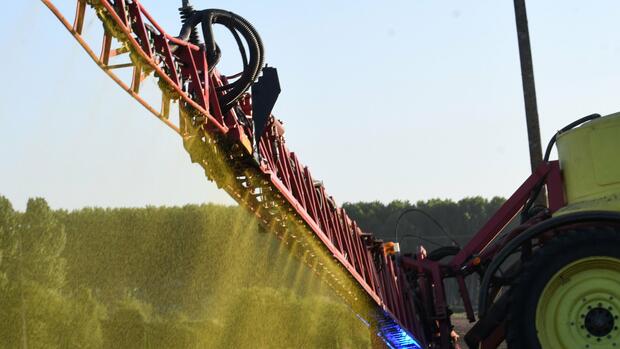The herbicide is the best-selling crop protection product worldwide.
(Photo: AFP/Getty Images)
Frankfurt A weak agricultural business has a negative impact on Bayer’s annual targets. For 2023, currency-adjusted sales of 48.5 to 49.5 billion euros and an adjusted operating profit (Ebitda) of 11.3 to 11.8 billion are now expected, as the agricultural and pharmaceutical group announced on Monday evening.
So far, a currency-adjusted sales increase of two to three percent to 51 to 52 billion and an adjusted operating result of 12.5 to 13 (previous year: 13.5) billion euros had been promised.
However, Bayer had already admitted in May that only the lower end of these goals is achievable.
Bayer attributed the lowering of the forecast primarily to a further “massive” drop in sales of glyphosate-based products.
The group must therefore write off 2.5 billion euros, mainly because of the glyphosate business. In the second quarter, this should lead to a consolidated loss of around two billion euros.
The fall in prices for weed control products containing glyphosate had already had a negative impact in the first quarter of the year. Poor weather conditions and lower sales due to the reduction in inventories by customers also caused additional pressure.
>>Read here, how Brussels is dealing with the issue of glyphosate at Bayer.
Many analysts had recently assumed that Bayer would have to cut its targets. The company has also lowered its forecast for earnings per share significantly and now expects free cash flow of “about zero euros” instead of about three billion euros. According to preliminary figures, Bayer expects sales of around EUR 11 billion (same period last year: EUR 12.82 billion) and adjusted earnings of around EUR 2.5 (3.35) billion in the second quarter.
The price of glyphosate and similar products has fallen.
(Photo: dpa)
In 2022, the Leverkusen-based group had benefited from significantly higher prices and a 44 percent jump in sales in the herbicide business after the competition experienced production bottlenecks as a result of Hurricane Ida and Chinese suppliers were also unable to close the gap due to the pandemic. However, after the competitors returned to the market, prices fell significantly.
Bayer shares reacted to the capping of the targets with discounts of around three percent: the papers were initially around 50 euros after the trading day after 51.49 euros at the regular Xetra close of trading.
More: Why things are going badly in the chemical industry – and how the industry will continue

